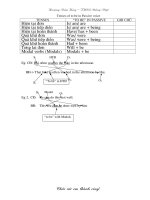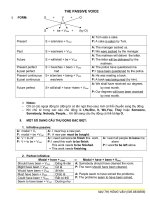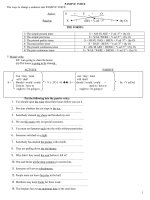test passive voice
Bạn đang xem bản rút gọn của tài liệu. Xem và tải ngay bản đầy đủ của tài liệu tại đây (82.35 KB, 3 trang )
TEST 2
I. Choose the best answer a,b,c or d:
1. This novel………………in the seventeenth century.
a. is written b. is writing c. was written d. was writing
2. Lan didn’t come to the party because she …… after her younger brother.
a. looked b. looks c. is being looked d. lookes
3. She ………me if I could speak Chinese.
a. asked b. told c. talked d. said
4. Since 1975 our country ………… independent
a. was b. have being c. have been d. has been
5. My father asked me …… I ate noodle or rice
a. if b. whether c. what d. that
6. She goes to the library twice a week. She ……… reads books there
A/ never B/ usually C/rarely D/ once
7. Sally has been working here since she …… college
A/ has left B/ leaves C/ left D/ is leaving
8 He ………….very hard recently .
A. Has worked B. is working C. works D. worked
9. Hurricane Andrew through southern Florida in August 1992.
A. sweep B. swept C. to sweep D. sweeping
10. She has taught English here 10 years.
A in b. for c. since d “.from
11. These English books……….yesterday.
A .bought B. buy C. was bought D. were bought
12. He asked his mother when she ……… married
a. get b. got c. has gotten d. gets
13. In the future, machines all the work for us.
A. do B. will do C. are doing D. were doing
14. Ba is in his room. He the guitar now.
A. play B. plays C. is playing D. will play
15. Next month is Lien’s birthday. She some of her friends to her
birthday party
a. is going to b. invite c. invited d. invites
II. Give the correct form of the verb in brackets
1. Jeans ( make ) ………………… about two hundred years ago , and now they
( sell ) ……………………… in every corner of the word .
2. Her brother ( talk ) ………………………………to his penpal on the phone at the
moment . They ( not contact ) ………………………… to each other for a long time .
3. A new cloth shop just ( open ) ……………………………near my aunt’s house.
4. Would you like (come)……………. and visit me next summer ?
5. We (not, write)……………………. To each other since last Christmas
6. Linh’s holiday last year ……………….(cost) over $1000
7. Before Minh( come)…………… back home, he( finish)…………… all his work
8. She (learn) ………………….to drive car since She (be)…………… in 14
9. He usually (watch)…………………TV in the evening
10. These shoes (buy)……………… by my mother and sister for 2 weeks
11 . Don’t be late! We (miss)………………… the train
12. The delicious food (cook)…………………. …………… at the present
13. When I ( come)…………… home, It (rain)……………… heavily
14. The dress ( wear) …………………………. Beautifully last night
III. READING: Read the passage carefully :
Why did English become the international language? In the middle of the nineteenth
century, French was the international language. Then Britain became very powerful in the
world. By 1900, England had colonies in other parts of Asia, Africa and South Pacific.
The people in the colonies had to use English. Slowly it became more important than
French internationally. After the Second World War, the United States became very
powerful, and even more people began to learn English.
English is the native or official language on one-fifth of the land area of the world. It is
spoken in North America, Great Britain, Australia and New Zealand. In South Africa and
India, it is one of the official languages.
More people study English than any other languages. In many countries, the textbooks in
universities are in English. More than three-fourth of the world’s mail is in English. More
than three-fifth of the world’s radio stations use English, too.
( Note: - colony (n): thuộc địa)
Choose the best answer A, B, C or D for each question
1. Which language was the international language inthe middle of the nineteenth century?
A. English B. French C. Chinese D. Japanese
2. The people in the colonies of England had to use…………………………….
A. Vietnamese B. English C. French D. Italian
3. Where is English used as the native language?
A. New Zealand and Great Britain B. India and North America
C. South Africa and North America D. A and C are correct
4. How many percents of the world’s mail are written in English?
A. more than sixty percents B. more than fifty percents
C. more than seventy-five percents D. more than twenty-five percents
Answer True or False
1. England had colonies in other parts of Asia, Africa and South Pacific by 1900.
2.In a few countries, the textbooks in universities are in English.
3. English is the native or official language on two-fifth of the land area of the world.
4. The world’s radio stations don’t use English.
IV Complete the second sentence so that it has the same meaning with the first one
1. People grow rice in tropical countries.
Rice____________________________________.
2. You must plan your work carefully . (Use passive form)
………………………………………………………………
3. They did not finish the kitchen on Mon day
The kitchen ……………………………
4. How many people are there in our school?
We want to know ………………………………………?
5. . “I have visited this beauty spot many times” said my father.
My father told me…………………………………
6. The farmers spread the trees each week
The trees …………………………………
7. They are watching my father’s new car
My father’s new car………………………
8. What time does Nam have to leave?
Do you know …………………………………………………?
9. Mai said to Bin : “ Do you like going to Da Lat on your summer vacation?”
Mai asked Bin………………………………………………………………
10. “ Do you want to stay in large house or small and beautiful house”
He wanted to know…………………………………………………………
V. Read the paragraph and choose the best answers
My teacher, Miss Green, is a young lady (1) twenty-five. She is a pretty lady.
She loves her pupils (2) She never (3) angry with them.
Miss Green (4) teaching her pupils. Sometimes she tells (5) many
interesting stories. I like to listen to her stories (6) they all help us to learn
some (7) lessons.
Sometimes she takes us out (8) a picnic. Whenever she takes us out, she tries
to teach us something (9) .
It is my dream that (10) I grow up I can become a good teacher like her.
1. A. of B. with C. from D. by
2. A. very many B. very much C. too D. so
3. A. is B. gets C. makes D. comes
4. A enjoy B. enjoying C. enjoys D. to enjoy
5. A. we B. they C. I D. us
6. A. because B. when C. where D. why
7. A. use B. useful C. using D. to use
8. A. from B. by C. for D. of
9. A. old B. new C. bad D. well
10. A. where B. why C. what D. when









